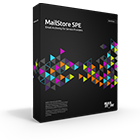Difference between revisions of "Instance Administration"
| [checked revision] | [checked revision] |
Ltalaschus (talk | contribs) |
Ltalaschus (talk | contribs) |
||
| Line 53: | Line 53: | ||
** [[msserver:Office 365 Integration|Microsoft 365 (Basic Authentication)]] | ** [[msserver:Office 365 Integration|Microsoft 365 (Basic Authentication)]] | ||
** [[msserver:Application Integration|Application Integration]] | ** [[msserver:Application Integration|Application Integration]] | ||
| − | ** [[msserver: | + | ** [[msserver:Google_Workspace_Integration|Google Workspace]] |
** [[msserver:IceWarp Server Integration|IceWarp Server]] | ** [[msserver:IceWarp Server Integration|IceWarp Server]] | ||
** [[msserver:Kerio Connect Integration|Kerio Connect]] | ** [[msserver:Kerio Connect Integration|Kerio Connect]] | ||
Latest revision as of 08:08, 2 January 2025
The core functionality of an instance is identical to that of an on-premises MailStore Server. Therefore, this article is a collection of links to the corresponding section of the MailStore Server help.
Archive Email
Emails can be archived from the mailboxes of email servers such as Microsoft Exchange as well as from the locally installed email clients of the users. Dependent on its type, archiving tasks can be performed continuously, manually or based on a schedule.
If you are not sure which archiving method best suits your company, please refer to chapter Choosing the Right Archiving Strategy.
In chapter Email Archiving with MailStore Basics you can find out more about working with archiving profiles, archiving specific folders, deleting emails after archiving and automating the archiving process.
Email Servers
A large collection of email servers is supported by MailStore for archiving email. As the actual procedure of setting up archiving depends on the email server you are using, specific instruction for well-known email servers are provided in our Implementation Guides below:
Please note: For various reasons, not all email servers and archiving strategies are fully supported in MailStore SPE (e.g. Gmail, MailStore Proxy). When in doubt, contact our technical support.
Microsoft 365 & Microsoft Exchange Servers & Outlook.com
- Microsoft Exchange Online / Microsoft 365 (Modern Authentication)
- Microsoft Exchange Online / Microsoft 365 Hybrid
- Microsoft Exchange SE
- Microsoft Exchange 2019
- Microsoft Exchange 2016
- Outlook.com (Hotmail, Live, MSN)
Google Workspace & Gmail
IMAP/POP3-based Email Servers
- MDaemon Email Server
- Kerio Connect (Kerio MailServer)
- IceWarp Server
- Intra2net Appliance Pro / Business Server
- hMailServer
- Tobit David.fx
- Zimbra Collaboration Suite
- Linux-based Email Server
- Archiving Emails Without Your Own Emailserver
(e.g. Hosted Exchange or POP3/IMAP-mailbox provided by an ISP)
Email Gateways
Legacy Implementation Guides
For IMAP and POP3 servers, that are not listed above, the following generic instruction might be helpful:
Email Clients
Archiving Email from Outlook, Thunderbird and Other E-mail Clients
As opposed to all other archiving features, it is imperative that the E-mail Archive Client software is installed on the user computers when archiving emails from these users' email applications. Once the archiving task is set up, it can be started manually by the user or executed automatically according to a schedule. Additional information about this topic is available in chapter Archiving Email from Outlook, Thunderbird and others.
Email Files
Archiving Outlook PST Files
As administrator, you can archive Microsoft Outlook PST files for other MailStore users. Additional information about these topics is available in chapter Archiving Outlook PST Files Directly.
Archiving EML or MBOX Files
As administrator, you can archive emails from .eml or .msg files for other MailStore users. Additional information about these topics is available in chapter Archiving Emails from External Systems (File Import).
Export Email
MailStore provides several functions regarding the export of archived emails. Emails can be exported directly into server mailboxes, or to the file system as individual email files (EML or MSG format), for example.
Find detailed instruction in the Exporting Email article of the MailStore Server Help.
Please note: Backup strategies (a backup of the entire archive) are discussed separately in the article Backup and Restore.
Administrative Tools
The Administrative Tools provides access to the following settings:
Users and Privileges |
ComplianceManagement APIMiscellaneous |
